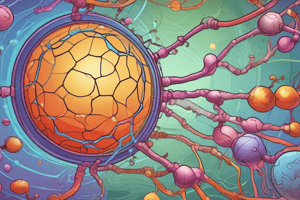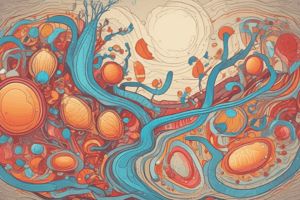Podcast
Questions and Answers
What is the product of glycolysis?
What is the product of glycolysis?
- Pyruvate (correct)
- Glucose
- ATP
- NADH
What are the two phases of the glycolysis pathway?
What are the two phases of the glycolysis pathway?
- Investment and Yield (correct)
- Investment and Reaction
- Yield and Reaction
- Yield and Investment
Where does glycolysis occur in most organisms?
Where does glycolysis occur in most organisms?
- In the nucleus
- In the mitochondria
- In the cytoplasm (correct)
- In the cell membrane
Flashcards are hidden until you start studying
Study Notes
- Glycolysis is the metabolic pathway that converts glucose (C6H12O6) into pyruvate (CH3COCO2H).
- The free energy released in this process is used to form the high-energy molecules adenosine triphosphate (ATP) and reduced nicotinamide adenine dinucleotide (NADH).
- Glycolysis is a sequence of ten reactions catalyzed by enzymes.
- The glycolysis pathway can be separated into two phases: the investment phase and the yield phase.
- In most organisms, glycolysis occurs in the liquid part of cells, the cytosol.
Studying That Suits You
Use AI to generate personalized quizzes and flashcards to suit your learning preferences.




